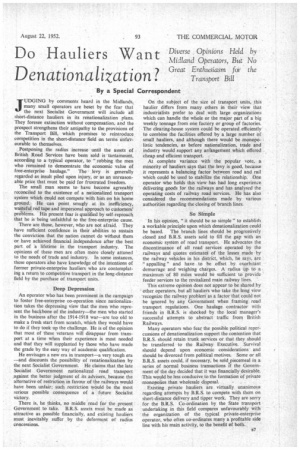Do Hauliers Want
Page 41

If you've noticed an error in this article please click here to report it so we can fix it.
Denationalization?
By a Special Correspondent JUDGING by comments heard in the Midlands, many small operators are beset by the fear that the next Socialist Government will include all short-distance hauliers in its renationaliza.tion plans. They foresee extinction without compensation, and the prospect strengthens their antipathy to the provisions of the Transport Bill, which promises to reintroduce competition in the short-distance field on terms unfavourable to themselves.
Postponing the radius increase until the assets of British Road Services have been sold is 'tantamount, according to a typical operator, to "robbing the men who remained to demonstrate the economic value of free-enterprise haulage." The levy is generally regarded as insult piled upon injury, or as an unreasonable price that must be paid for frustrated freedom.
The small man seems to have become agreeably reconciled to the existence of a nationalized transport system which could not compete with him on his home ground. He can point smugly at its inefficiency, wasteful red tape and impersonal. approach to customers' , problems. His present fear is qualified by self-reproach that be is being unfaithful to the free-enterprise cause.
There are those, however, who are not afraid. They have sufficient confidence in their abilities to sustain the conviction that the nation cannot do without them or have achieved financial independence after the best part of a lifetime in the transport industry. The opinions of these men are often more closely attuned to the needs of trade and industry. In some instances, these operators also have knowledge of the intentions of former private-enterprise hauliers who are contemplating a return to competitive transport in the long-distance field by the purchase of transport units.
Deep Depression
An operator who has been prominent in the campaign to foster free-enterprise co-operation since nationalization takes the depressing view that the men who represent the backbone of the industry—the men who started in the business after the 1914-1918 war----are too old to make a fresh start from scratch, which they would have to do if they took up the challenge. He is of the opinion that most of these veterans will disappear from transport at a time when their experience is most needed and that they will supplanted by those who have made the grade by the easy way of academic qualification.
He envisages a new era in transport—a very tough era —arid discounts the possibility of renationalizatiori by the next Socialist Government. He claims that the late Socialist Government nationalized road transport :against the better judgment of its advisers, because the alternative of restriction in favour of the railways would have been unfair; such restriction would be the most serious possible consequence of a future Socialist victory.
There is, he thinks, no middle road for the present Government to take. B.R.S. assets must be made as attractive as possible financially, and existing hauliers must inevitably suffer by the deferment of radius concessions. On the subject of the size of transport units, this haulier differs from many others in their view that industrialists prefer to deal with large organizations which can handle the whole or the major part of a big weekly tonnage .from one factory or group of factories. The clearing-house system could be operated efficiently" to combine the facilities offered by a large number of small hauliers, and although there would be monopolistic tendencies, as before nationalization, trade and industry would support any arrangement which offered cheap and efficient transport.
At complete variance with the popular vote, a minority of hauliers says that the levy is good, because it represents a balancing factor between road and rail which could be used to stabilize the relationship. One operator who holds this view has had long experience delivering goods for the railways and has analysed the operating costs of railway road services. He has also considered the recommendations made by various authorities regarding the closing of branch lines.
So Simple In his opinion, "it should be so simple" to establish a workable principle upon which denationalization could be based. The branch lines should be progressively closed and B.R.S. assets sold to fill the gap with an economic system of road transport. He advocates the discontinuance of all road services operated by the railways and quotes estimates of the losses made by the railway vehicles in his district, which, he says, are " appalling " and have to be offset by exorbitant demurrage and weighing charges. A• radius up to a maximum of 80 miles would be sufficient to provide feeder services to the revitalized main railway lines.
This extreme opinion does not appear to be shared by other operators, but all hauliers who take the long view -recognize the railway problem as a factor that could not be ignored by any Government when framing road transport regulations. One haulage contractor with friends in B.R.S. is shocked by the local manager's successful attempts to abstract traffic from British Railways.
Many operators who fear the possible political repercussions of denationalization support the contention that B.R.S. should retain trunk services or that they should be transferred to the Railway Executive. Survival should depend upon economic considerations and should be divorced from political motives. Sonic or all B.R.S. assets could, if necessary, be sold piecemeal in a series of normal business transactions if the Government of the day decided that it was financially desirable. This would be less conducive, to the formation of private monopolies than wholesale disposal.
Existing private hauliers are virtually unanimous regarding attempts by B.R.S. to compete with them on short-distance delivery and tipper work. They are sorry for the B.R.S. Co-ordination by the State transport undertaking in this field compares unfavourably with the organization of the typical private-enterprise operator, who often co-ordinates many a profitable side line with his main activity, to the benefit of both.




















































































